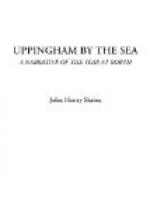The wooden school-room, the slow completion of which had been watched with some impatience, was ready for use on April 29th. On the next day, being Sunday, we inaugurated it by reuniting under its shelter our scattered congregations, hitherto distributed over the three largest rooms at our disposal. It was not a noble building, being, architecturally, a long shed of rough planks against the bowling-green wall, which was whitewashed for the better lighting of the room. But it was apt to the conditions of a colony, looking as it did like a log-house in a backwoods-clearing. Internally it was well lighted and ventilated, and just sufficient for our numbers. Heureusement il n’y on a pas beaucoup. This was not the only occasion on which we were thankful for the school’s self-imposed limit of numbers. The completion of this poor structure was a fact of which those who have but little knowledge of school affairs will appreciate the value. It was a new burden on an embarrassed exchequer, but not a gratuitous one. It is not too much to say that the social life of the school would have been of a different and lower stamp, and its organisation crude and ineffective, if there had been no place of assembly where we could meet for common occasions, for roll-call, prayers, addresses, lectures, entertainments—no place to furnish the visible unity, which is so large an influence in a healthy social life. And did the school ever feel surer of its oneness, or more proud of its name, than when it sat on those rude benches within the ruder walls of their makeshift great school-room?




